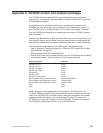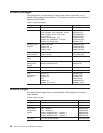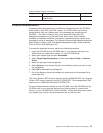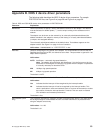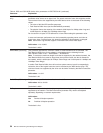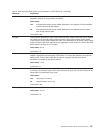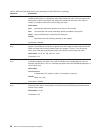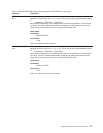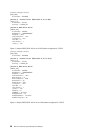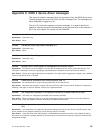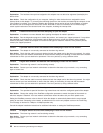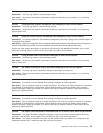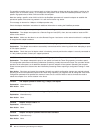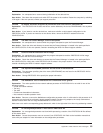
Table 9. DOS and OS/2 NDIS device driver parameters in PROTOCOL.INI (continued)
Parameter Explanation
RTSWMode (OS/2 only) This parameter indicates whether the driver should enable code that attempts to send
routable traffic directly to a destination rather than through the router. This can improve the
performance of these connections and reduce the workload at the router. If the value is
Disable, all routable frames will be sent through the router.
Valid values:
Auto Automatically determines whether to use Peer or Client mode.
Peer Communicates with a peer destination station to establish a direct path.
Client Uses an MSS server to determine the direct path.
Disable
Deactivates the route switching function for this adapter.
The default is Disable.
RTSWTableSize (OS/2
only)
This parameter specifies the number of entries allowed in the route table for route switching
support. This should be set equal to or greater than the number of remote stations that this
station will send data to using routable frames (for example, TCP/IP). If it is set too low,
some of the traffic that could be sent directly will instead be sent through the router.
Valid values: 16, 32, 64, 128, 256, 512, 1024
The default is 16.
RTSWSubnetMask (OS/2
only)
This parameter contains a character string specifying the IP Subnet Mask for the IP subnet
to which this adapter will attach. This value is entered as an IP dotted decimal value, for
example, 255.255.255.0. This is a mandatory parameter when the RTSWMode parameter is
set to Auto or Peer.
Valid values:
xxx.xxx.xxx.xxx
A dotted-decimal IP network number (15 characters maximum).
Disable
When not in use.
The default is Disable.
RTSWHoldingTime (OS/2
only)
This parameter specifies the Route Switching information holding time value. This
determines how often a remote station must refresh its Route Switching information which
pertains to this station.
Valid values:2to20
The default is 20.
56 IBM 16/4 Token-Ring PCI Management Adapter




